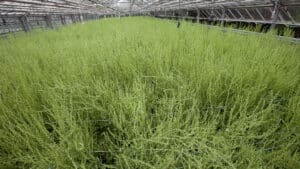Scientists from the University of Geneva and ETH Zurich report a new genetically-engineered cassava variety that produces high levels of vitamin B6.
Cassava is rich in calories but lacks vitamin content, particularly vitamin B6, and to achieve the required daily amount of vitamin B6, one would need to eat 1.3 kilograms of cassava everyday.
In the model plant Arabidopsis thaliana, professor Teresa Fitzpatrick from the University of Geneva discovered two enzymes (PDX1 and PDX2), which are involved in the production of vitamin B6. She used this discovery to increase vitamin B6 levels in cassava.
The scientists introduced the genes that code for the production of the enzymes into the cassava genome, leading to new cassava lines with increased amounts of vitamin B6. Furthermore, greenhouse and field trials showed that the new cassava lines are stable and vitamin B6 is bioavailable in plants.
Their research has been published in the latest issue of Nature Biotechnology.
It is still unclear when and how vitamin B6-enhanced cassava will find its way to farmers and consumers. The new trait should be crossed in varieties preferred by farmers using traditional plant breeding or introduced into selected varieties using genetic engineering.
When these cassava lines become publicly available, it could prevent vitamin B6 deficiency, particularly in sub-Saharan Africa where cassava is considered one of the most important staple crops. Source: ETH Zurich











